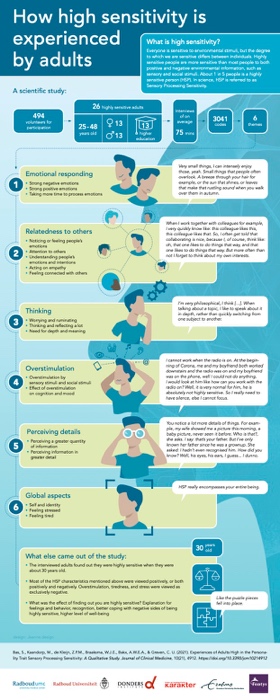Here are the details of a new research study on how it feels and what it is like to be highly sensitive. This could be a useful resource to help highly sensitive people explain to others who are not highly sensitive, health care professionals, family members etc. what it is like to be highly sensitive.
Although research in the field of sensitivity has identified multiple characteristics associated with this trait, the main aspects that characterise the day-to-day experiences of people with high sensitivity were yet to be uncovered.
In this first systematically-reported interview-based research study about what highly sensitive adults themselves see as important characteristics of their sensitivity. The research was aimed at exploring the everyday life and experiences of highly sensitive people, and provides a representation of the voices of highly sensitive people in the scientific literature.
Six main themes were derived which suggests that high sensitivity is experienced as a specific combination of characteristics. Details about each characteristic are found in the infographic below.

Examples include:
- having stronger positive and negative emotional reactions
- paying attention to other’s needs even at the costs of one’s own’s needs
- reflecting and thinking a lot
- being easily affected by sensory and social stimuli
- perceiving a greater quantity and more detailed information
- the idea that that high sensitivity encompasses your entire being and personal identity.
Dealing with ease of overstimulation
The researchers also asked people how they deal with being more easily overstimulated. The main strategy mentioned by almost all participants was the reduction of sensory input, such as the need for solitude and a quiet environment, and actions to reduce specific sensory input (e.g., wearing sunglasses).
A second main strategy mentioned by people were psychological strategies, such as seeking support from others, techniques such as mindfulness, meditation and yoga, as well as positivity, acceptance, and reflection.
A smaller subset of people also mentioned the ability to act autonomously, selecting a career that fits with being highly sensitive, exercising and a healthy diet, routine and structure, and avoiding watching the news or violence.
Finding out you are highly sensitive
The participants found out relatively late in life about their own sensitivity, but many experienced positive effects when finding out about their sensitivity. Moreover, they described being better able to cope with overstimulation, and for many it was a pathway to higher levels of well-being.
This suggests that raising awareness and educating the general public about this fundamental trait is important.
The full article can be read here on sensitivityresearch.com
